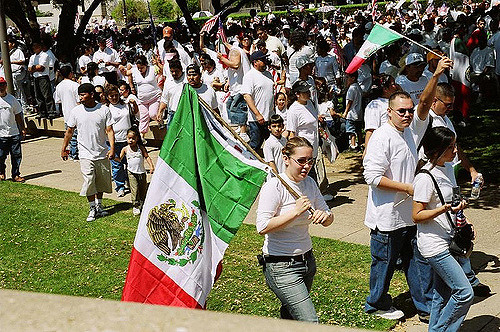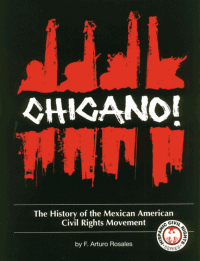Is there a place for the Mexican flag in U.S. political protests?

By Victor Landa, NewsTaco
“Protesters chose to bring out the Mexican flag to demonstrate their culture and not their nationality.” -David B. Villanueva, 23, of Chicanos Unidos in Santa Ana, quoted in the Los Angeles Times. The group participated in the anti-Trump demonstration this past Thursday in Orange County, California.
If you weren’t there in person to witness the anti-Trump demonstrations in Orange County, California, then you probably got your information from a carefully curated mas media story: your screen filled with the repeated image of protesters stomping on a police patrol car, Mexican flags waving among the chaos, Donald Trump calling the protesters thugs.
If that was the sliver of reality from which you formed your perspective, then hell no, Mexican flags have no place in U.S. political protest.
It’s a reality show perspective, perfect for the Trump reductionist, slogan-generating machine. [tweet_dis]If you’re a Trump sympathizer the Mexican flags at the protests served only to separate you further from the protesters’ reality[/tweet_dis]; you dislike them more and Trump has given you a one-word frame to define them – thugs.
[pullquote]If you wave the Mexican flag aloft while chanting slogans and marching in protest it morphs into something like Schrödinger’s cat.[/pullquote]A country’s flag is a universal symbol of political sovereignty – unless you stamp it on a bandanna or bikini, in which case it’s kitsch. But if you wave it aloft while chanting slogans and marching in protest it morphs into something like Schrödinger’s cat. The observer doesn’t know what it is, so she assumes: a cultural symbol, a foreign invasion, an expression of passion, a threat . . .
The flag waver, on the other hand, knows exactly what it is – a symbol of culture, an act of identity defiance. But it’s not easy to explain, so in a sense it’s ineffective. [tweet_dis]If you need to add an asterisk to your protest so folks don’t misunderstand your intent, you’re working too hard.[/tweet_dis]
In this specific, Orange County, example think of the contrast. A Mexican flag waved in protest with a cultural meaning that needs explanation, versus a single word – thug. The simple message carries farther.
So in answer to the question,[tweet_dis] is a Mexican flag appropriate in a U.S. political protest?, it depends.[/tweet_dis] [pullquote]When there are too many layers of meaning to be effective you tend to lose control of your narrative.[/pullquote]
What are you trying to accomplish?
If all you want to do is express yourself, pure intent regardless of outcome, then go for it. If waving the Mexican flag serves as a release of oppressive frustration, then the waving is therapeutic.
If you want to make a statement, cultural or otherwise, you may want to edit yourself a little, for the sake of clarity.
I understand what the protesters were saying. They were emphasizing their cultural pride, symbolizing their sense of belonging, marking a historical imperative that supersedes political boundaries. But when there are too many layers of meaning to be effective you tend to lose control of your narrative. The people you’re trying to reach will reduce their options to the least possible number, you reinforce their idea of “the other.”
This isn’t to criticize or discourage the waving of Mexican flags at U.S. political protests. Do it, but do it with clear-eyed purpose.
Would the stars and stripes work better to say what’s on your mind? Would the U.S. flag stake a claim for your cause in the U.S. political discourse in a way that the Mexican flag can’t?
Does it matter what others think?
I bring it up because it bothers me to see the wasted energy of people talking past each other. It’s like Schrödinger’s Cat, the act of waving the flag is in a superposition, it can be anything, until observed.
[Photo by Claudia A. De La Garza/Flickr]
Suggested reading


